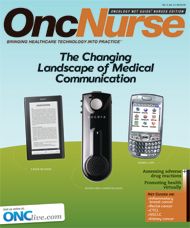Publication
Article
ONCNG Oncology Nursing
EPOCRATES: A Helping Hand for Nurses
Author(s):
Recalling medications, their side effects, dosing, and other information is a huge responsibility for professional nurses, and it is a duty that must be taken seriously. In nursing school, specifically in my pharmacology class, I remember how laborious it was trying to memorize the specifics of a variety of medications, and I started using Epocrates during this time to assist me with this endeavor.
Recalling medications, their side effects, dosing, and other information is a huge responsibility for professional nurses, and it is a duty that must be taken seriously. In nursing school, specifically in my pharmacology class, I remember how laborious it was trying to memorize the specifics of a variety of medications, and I started using Epocrates during this time to assist me with this endeavor. In case you are not familiar with Epocrates, it is PDA medical software that includes information on drug interactions, drug prices, dosing, diseases, and other relevant information, such as ICD9 codes. The software permitted me to quickly review a variety of medications, making me shine with my peers and instructors alike. Because of how robust the software is, my nursing school soon “strongly recommended” that all students use it. As a professional nurse, I am still an avid user of Epocrates, which has many useful functions for nurses. Let’s examine some of them.
Verifying Medication Administration
Today, professional nurses often serve as a physician’s right hand, offering expertise in a specific field and providing input regarding the treatment of patients whom they care for and often come to love. They also verify medication administration records by looking up and checking drugs; thus, nurses act as a second line of defense in ensuring no medications will adversely interact with others and that all pharmacotherapies are correct and are doing the job required of them. Epocrates makes this task painless with its numerous tools, such as the drug-drug interaction checkers.
Keeping Up-to-date
In the long-term care setting, nurses are often required to provide medication instruction to 15 or more residents. Nurses in this setting are also contending with polypharmacy, psychotropic drugs, and many other types of medications. As a result, it is imperative for them to keep abreast of these drugs so that they can provide residents with a brief synopsis of each one at a moment’s notice. Epocrates can facilitate this by allowing nurses to provide both patients and residents with all the pertinent information quickly and succinctly, while being assured that the information is current.
Facilitating Administrative Tasks
When I worked on assignment as a director of nursing in a long-term care facility, which was owned and operated by a large organization, I was called upon to perform as a minimum data set/prospective payment system (MDS/PPS) RN, and I processed multiple documents while the regular nurse took a much needed vacation. My knowledge of all the sections related to the document was rusty and it took me a while to complete several quarterly Admit and Change in Condition assessments. Having Epocrates software on my mobile device helped me identify a variety of medications, which made the whole process easier. It was especially helpful having the ability to check for interactions between multiple drugs, including prescriptions, herbal supplements, and over-the-counter options, on client’s medication administration records.
Enhancing Communication
When I worked as an independent consultant at an assisted living facility, I was called upon to evaluate a potential resident for admittance to the facility. This resident was a spunky, approximately 80-year- old woman who had sustained a fall that resulted in a hip fracture and required surgical intervention and subsequent placement into a rehab facility. After I evaluated her documentation for appropriateness, I took a few minutes to visit with her to obtain her side of the story and assess her needs and desires. While sitting by her bedside, I used my smartphone to review her chart and perform a medication review, and she inquired what I was “tapping away joyfully” at. I told her about the device in question and stated that I was performing some assessment work in preparation for her being admitted to the center. She remarked, “isn’t it wonderful what computers can do now,” and she wasn’t the only amazed by my smartphone’s capabilities. A physician who had been standing by the doorway had observed my activities and asked what other functions I may be able to perform with my smartphone. I provided him with a brief demonstration of its capabilities and the Epocrates program, showing him the up-to-date drug compendium, disease database with treatment recommendations, as well as the reference materials, calculators, and assessment tools. He was thoroughly impressed and asked where he might obtain a copy. We now often interact during our daily course of business, and he will now share his Epocrates discoveries with me, indicating they will “help me get better.” As this example demonstrates, Epocrates can be equally useful in opening lines of communication between healthcare providers and between providers and patients.
Take-home message
Perhaps this article sounds like an Epocrates testimonial, but having used a variety of software programs, I have found Epocrates to be an invaluable asset. The software has been as useful in helping me perform administrative functions as it has been in discussing matters with patients at the bedside. Working as a professional nurse is rewarding on numerous levels, and I know that my practice is top-notch because Epocrates helps me stay up-to-date on the most current information, ensuring I am always providing my patients with the best care possible.
Neil McElligott, RN, has served in a variety of roles in the long-term care setting and in hospice. He has participated in various organizations, including the Association for Professionals in Infection Control (APIC) and Medical Reserve Corps. (MRC). He is currently semi-retired, functioning as a consultant in matters of chart review and nursing process.
